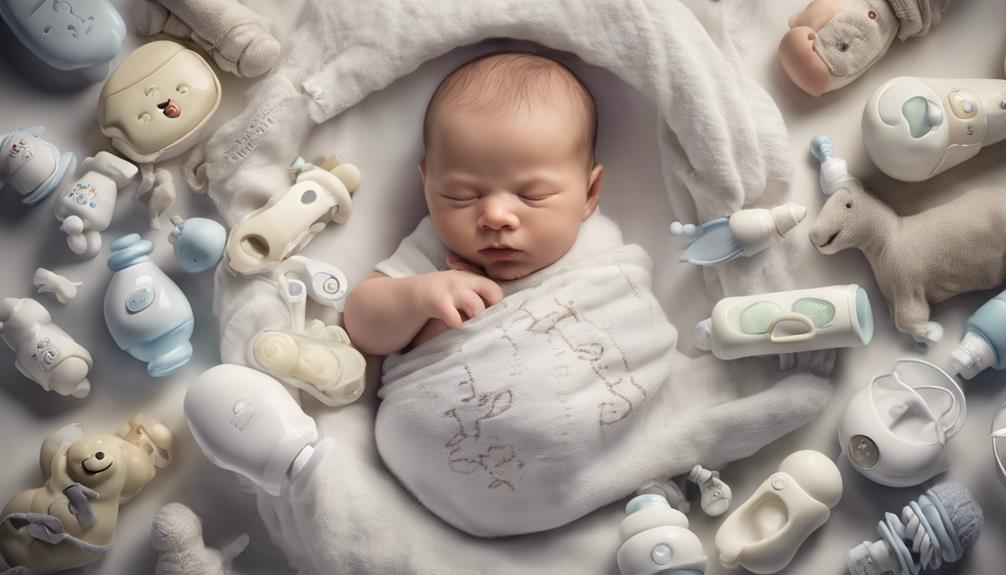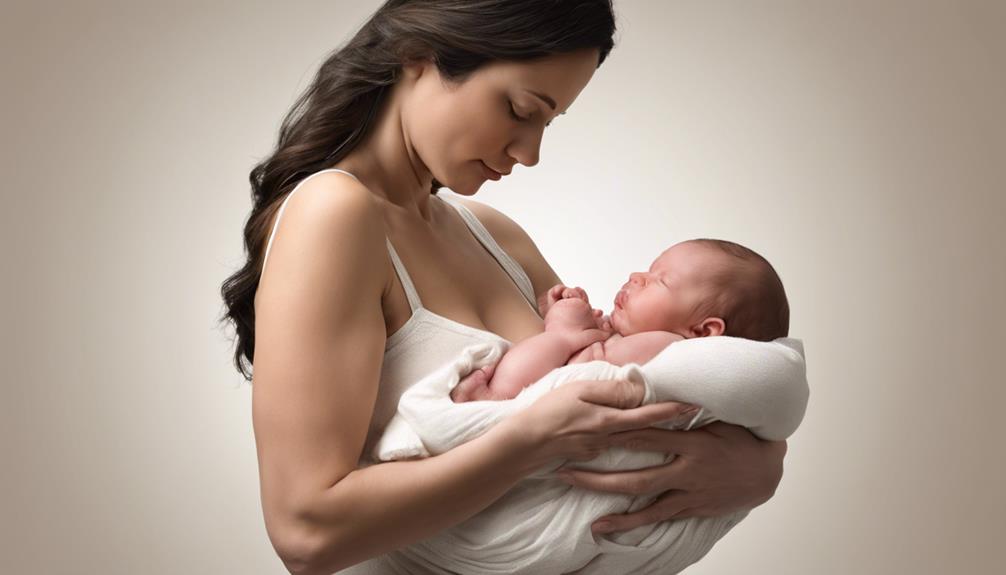Have you ever wondered why your newborn always seems to get hiccups?
It's a common occurrence that can leave you feeling puzzled and concerned, but there's more to it than meets the eye.
Understanding the underlying reasons behind your baby's hiccups can provide valuable insights into their well-being and development.
By exploring the potential causes and effective ways to guarantee your little one stays comfortable and healthy.
Key Takeaways
- Hiccups stem from diaphragm and feeding interactions
- Burping and calming techniques aid in hiccups management
- Immature nerve control and coordination issues can trigger hiccups
- Proper feeding positions and techniques help prevent newborn hiccups
Common Triggers for Newborn Hiccups
If your newborn is experiencing hiccups, it may be helpful to understand the common triggers that can lead to this common occurrence. Baby hiccups often stem from the diaphragm, a vital muscle involved in breathing. In newborns, the nerve control over the diaphragm is still developing, making it more prone to sudden contractions that result in hiccups.
One common trigger for baby hiccups is feeding. During or after a feeding session, the diaphragm can get stimulated, leading to hiccups. Additionally, if your baby swallows air while feeding, this can also contribute to hiccups. Ensuring a proper latch during breastfeeding or using anti-colic bottles can help prevent your baby from ingesting excess air.
Temperature changes in the stomach can also trigger hiccups in newborns. Sudden shifts in temperature, especially after feeding, may irritate the diaphragm and result in hiccups. Keeping your baby comfortably warm during and after meals can help prevent these temperature-related hiccups.
Duration of Newborn Hiccups

Newborn hiccups typically last for a few minutes to around 10 minutes at most, occurring multiple times a day but usually resolving on their own.
Here's what you need to know about the duration of your baby's hiccups:
- Brief Episodes: Most newborn hiccups are short-lived and shouldn't last longer than 10 minutes. These episodes are common and often nothing to worry about.
- Repetitive Nature: It's normal for your baby to experience hiccups several times a day. These episodes can come and go, but they generally don't last long enough to cause significant discomfort.
- Spontaneous Resolution: In many cases, newborn hiccups stop on their own without the need for any intervention. Your baby's tiny respiratory muscles are still developing, leading to occasional hiccups that resolve naturally.
Alleviating Newborn Hiccups Discomfort

To ease your baby's discomfort from hiccups, consider implementing gentle techniques like burping during and after feedings. Burping helps release trapped air in the stomach, reducing the chances of hiccups occurring.
Changing your baby's feeding position, like holding them upright, can also aid in alleviating hiccups. This position helps prevent the reflux of milk and air into the esophagus, which can trigger hiccups.
Offering a pacifier for your baby to suck on may help soothe their diaphragm and potentially stop hiccups. Additionally, gently patting or rubbing your baby's back while they've hiccups can provide comfort and help the hiccups pass quicker.
Creating a calm and relaxed environment during hiccups can also help your baby relax, reducing the duration of the hiccups. Remember, these simple techniques can make a significant difference in alleviating your baby's discomfort from hiccups.
Preventing Newborn Hiccups

To prevent hiccups in your baby, make sure to burp them frequently during and after feedings. This helps release trapped air and promotes their comfort. Here are some essential tips to prevent those pesky hiccups:
- Upright Position: Make certain your baby is in an upright position while feeding. This can reduce the chances of hiccups as they swallow less air.
- Slow Feeding Techniques: Use slow feeding techniques to prevent your baby from swallowing excess air, which can lead to hiccups.
- Smaller, More Frequent Feedings: Offering smaller, more frequent feedings can prevent overeating and stomach distention, which are common triggers for hiccups.
Understanding Newborn Hiccup Causes
Burping your baby frequently during and after feedings not only aids in releasing trapped air but also plays a significant role in understanding the causes behind newborn hiccups. Newborn hiccups occur due to the developing diaphragm experiencing spasms and rapid vocal cord closure. The immature nerve control of the diaphragm in newborns makes them more prone to hiccups, which can actually contribute to healthy brain development. Premature babies, with their developing reflexes, are at higher risk of hiccups. Additionally, coordination issues in breathing and swallowing can trigger hiccups in newborns.
| Causes | Description |
|---|---|
| Developing Diaphragm | Spasms and rapid vocal cord closure |
| Developing Reflexes | Immature nerve control, more common in premature babies |
| Healthy Brain Dev. | Hiccups may contribute positively to brain development |
| Coordination Issues | Breathing and swallowing coordination issues can trigger hiccups |
Frequently Asked Questions
Why Does My Newborn Get Hiccups All the Time?
Your newborn gets hiccups often because their tiny diaphragm is still developing. It's a normal part of their growth, showing their nervous system is maturing. As they grow, these hiccups will become less frequent.
How Do I Stop My Baby From Having Hiccups After Feeding?
To stop your baby from getting hiccups after feeding, try burping frequently, feeding calmly upright, offering smaller meals, and avoiding fast feeding. Gently pat or rub your baby's back post-feeding to help prevent hiccups.
When Are Baby Hiccups a Concern?
When baby hiccups persist, cause discomfort, affect sleep or feeding, or last over 5-10 minutes, it's time to seek medical advice. Changes in skin color, especially turning dusky or blue, should prompt immediate action.
Is It OK to Lay Baby Down With Hiccups?
It's safe to lay your baby down with hiccups since it doesn't affect breathing. If hiccups persist or cause distress, consult a pediatrician. For babies with reflux, keeping them upright may help prevent vomiting.
Conclusion
So next time your little one starts hiccuping, remember it's just their developing diaphragm having a little dance party!
Just like a gentle breeze on a sunny day, these hiccups are a natural part of their growth.
By understanding the triggers, duration, and remedies for newborn hiccups, you can help your baby feel more comfortable and enjoy watching them grow and thrive.









